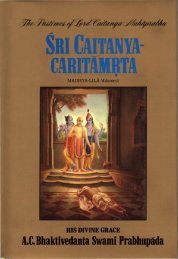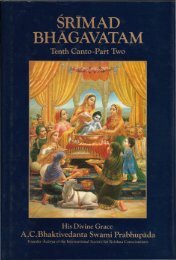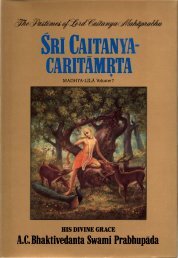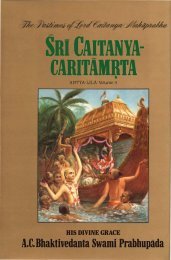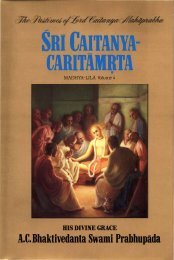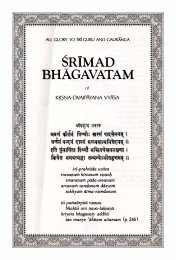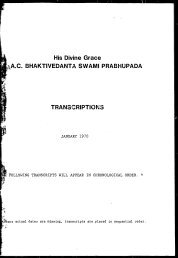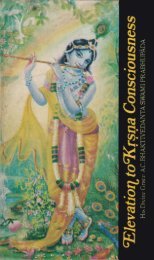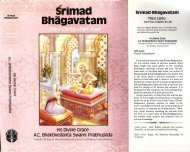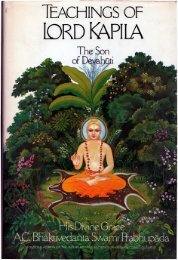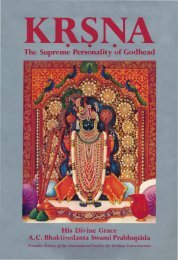- Page 1 and 2: crhe GNect rof C:Ve ·t ·By CJ!is
- Page 7 and 8: " IIfI'J')!j1;1.NOI.LOA30 .iO 11V.L
- Page 10 and 11: Ii·JtII:fI-I-1IItICopyright © 197
- Page 12 and 13: I'ContentsPrefaceixIntroductionxvii
- Page 15 and 16: PrefaceThe Nectar of Devotion is a
- Page 17: PrefaceXlsuch as Persian and Arabia
- Page 21: Preface.XVdistributed throughout th
- Page 29 and 30: IntroductionXlXtwithin each of thes
- Page 31 and 32: IntroductionXXl.:.energy, and the m
- Page 33 and 34: IntroductionXXlllconclusion of void
- Page 35: 3NO11Vd
- Page 38 and 39: 2 The Nectar of Devotion4) Pure dev
- Page 40 and 41: 4 The Nectar of Devotionrecommended
- Page 42 and 43: L6 The Nectar of Devotionphant who
- Page 44 and 45: 8 The Nectar o.fDevotionness even t
- Page 46 and 47: 10 The Nectar of Devotionactivities
- Page 48 and 49: 12 The Nectar of Devotionhim, becau
- Page 50 and 51: 14 The Nectar of Devotionsiistra wh
- Page 52 and 53: 16 The Nectar of DevotionSrimad-Bhi
- Page 54 and 55: 2 I The First Stages of DevotionThe
- Page 56 and 57: 20 The Nectar of Devotionpractice.
- Page 58 and 59: 22 The Nectar of Devotionbegin the
- Page 60 and 61: 24 The Nectar of Devotiongetting Hi
- Page 62 and 63: 26 The Nectar of Devotiontion so th
- Page 64 and 65: 3 I Eligibility of the Candidatefor
- Page 66 and 67: 30 The Nectar of Devotionor to sati
- Page 68 and 69:
32 The Nectar of Devotionis also co
- Page 70 and 71:
34 The Nectar of Devotionthe same b
- Page 72 and 73:
36 The Nectar of Devotionchildren,
- Page 74 and 75:
38 The Nectar of DevQtionBrahma dow
- Page 76 and 77:
40 The Nectar of Devotionif they ar
- Page 78 and 79:
42 The Nectar of Devotiondear Lord,
- Page 80 and 81:
44 The Nectar of Devotion"Icould th
- Page 82 and 83:
:5 I Purity of Devotional ServiceAl
- Page 84 and 85:
48 The Nectar of DevotionSrila Riip
- Page 86 and 87:
50 The Nectar of Devotionthat if a
- Page 88 and 89:
..._..__._.._._._._.__..____L52 The
- Page 90 and 91:
54The Nectar of DevotionKrwa, we mu
- Page 92 and 93:
56 The Nectar of Devotionleast one
- Page 94 and 95:
7 I EvidenceRegarding Devotional Pr
- Page 96 and 97:
60 The Nectar of DevotionTo Follow
- Page 98 and 99:
62 The Nectar of DevotionIn the Bra
- Page 100 and 101:
64 The Nectar of Devotionaccept thi
- Page 102 and 103:
66 The Nectar of Devotionoffered a
- Page 104 and 105:
8 I Offenses to be A voidedIn the s
- Page 106 and 107:
70 The Nectar of Devotionshould not
- Page 108 and 109:
l -72The Nectar of Devotionthe chan
- Page 110 and 111:
74 The Nectar of Devotionnot do any
- Page 112 and 113:
76 The Nectar of DevotionBowing Dow
- Page 114 and 115:
78 The Nectar of Devotionhouse of a
- Page 116 and 117:
80 The Nectar of Devotionof the res
- Page 118 and 119:
82 The Nectar of Devotiongo to one'
- Page 120 and 121:
lL84 The Nectar of Devotiontional s
- Page 122 and 123:
86 The Nectar of Devotionbecome cur
- Page 124 and 125:
88 The Nectar of Devotiongods." Thi
- Page 126 and 127:
90 The Nectar of DevotionIIIn the F
- Page 128 and 129:
92 The Nectar of DevotionRemembranc
- Page 130 and 131:
94 The Nectar of Devotionthe Lord,
- Page 132 and 133:
ll I Aspects of Transcendental Serv
- Page 134 and 135:
98 The Nectar of Devotionher five h
- Page 136 and 137:
100 The Nectar of Devotiondevotiona
- Page 138 and 139:
12 I Revealed ScripturesAccording t
- Page 140 and 141:
104 The Nectar of Devotionthrough H
- Page 142 and 143:
106 The Nectar of Devotionthe ripen
- Page 144 and 145:
13 I The Maha-mantraThe importance
- Page 146 and 147:
llOThe Nectar of DevotionIt is furt
- Page 148 and 149:
112 The Nectar of Devotionto Him al
- Page 150 and 151:
14 I Devotional QualificationsSome
- Page 152 and 153:
116 The Nectar of Devotionnot offer
- Page 154 and 155:
118 The Nectar of Devotiontentional
- Page 156 and 157:
;120 The Nectar of DevotionThe idea
- Page 158 and 159:
122 The Nectar of Devotionnation, a
- Page 160 and 161:
124 The Nectar of DevotionSometimes
- Page 162 and 163:
126 The Nectar of Devotionassociati
- Page 164 and 165:
128 The Nectar of DevotionWe must a
- Page 166 and 167:
130 The Nectar of Devotionboth of t
- Page 168 and 169:
132 The Nectar of DevotionParenthoo
- Page 170 and 171:
134 The Nectar of Devotionthere wer
- Page 172 and 173:
136 The Nectar of DevotionKr!J.a. T
- Page 174 and 175:
18 I Characterof One in Ecstatic Lo
- Page 176 and 177:
140 The Nectar of Devotionyouthful
- Page 178 and 179:
142 The Nectar of Devotionand His l
- Page 180 and 181:
144 The Nectar of Devotionservice o
- Page 182 and 183:
146 The Nectar of DevotionKr!la and
- Page 184 and 185:
148 The Nectar of Devotionter. In t
- Page 186 and 187:
150 The Nectar of Devotiontaneous e
- Page 189 and 190:
PART TWO20 I Transcendental MellowI
- Page 191 and 192:
Transcendental Mellow 154favor of G
- Page 193 and 194:
21 I Qualities of Sri KraPersonal f
- Page 195 and 196:
Qualities of Sri K[§[W 158sons of
- Page 197 and 198:
Qualities of Sri K[§!la 160and on
- Page 199 and 200:
Qualities of Sri Kr§!W 162language
- Page 201 and 202:
Qualities of Sri K[§!W 164even His
- Page 203 and 204:
Qualities of Sri K[§[W 166people o
- Page 205 and 206:
Qualities of Sri Knrw 168expert. Ab
- Page 207 and 208:
Qualities of Sri Kmw 170The promise
- Page 209 and 210:
Qualities of Sri Knr;w 17222. Self-
- Page 211 and 212:
Qualities of Sri Knrw 174kind that
- Page 213 and 214:
Qualities of Sri K!§[La 176was in
- Page 215 and 216:
22 I Qualities of KraFurther Explai
- Page 217 and 218:
Qualities of K[§!la Further Explai
- Page 219 and 220:
Qualities of K[§[ta Further Explai
- Page 221 and 222:
Qualities of K[§fW Further Explain
- Page 223 and 224:
Qualities of Kr§!W further Explain
- Page 225 and 226:
Qualities of K[§!W Further Explain
- Page 227 and 228:
Qualities of K[§rla Further Explai
- Page 229 and 230:
Qualities of K[§[La Further Explai
- Page 231 and 232:
Qualities of Kr§rta Further Explai
- Page 233 and 234:
Qualities of K[§[W Further Explain
- Page 235 and 236:
Qualities of Kr§rw Further Explain
- Page 237 and 238:
23 I Kra's PersonalitySrila Riipa G
- Page 239 and 240:
K[§[La's Personality 202Dhira-pras
- Page 241 and 242:
Krra's Personality 204understand th
- Page 243 and 244:
Further Traits of Sri Kf§!W 206spe
- Page 245 and 246:
..Further Traits of Sri K[§rla 208
- Page 247 and 248:
Devotees of K[§[W 210transcendenta
- Page 249 and 250:
Devotees of K[§!W 212them." Anyone
- Page 251 and 252:
26 I Stimulation for Ecstatic LoveS
- Page 253 and 254:
Stimulation for Ecstatic Love 216an
- Page 255 and 256:
Stimulation for Ecstatic Love 218ti
- Page 257 and 258:
Stimulation for Ecstatic Love 220as
- Page 259 and 260:
Stimulation for Ecstatic Love 222Th
- Page 261 and 262:
Stimulation for Ecstatic Love 224wi
- Page 263 and 264:
Symptoms of Ecstatic Love 226bereft
- Page 265 and 266:
Symptoms of Ecstatic Love 228is sta
- Page 267 and 268:
28 I Other Ecstatic SymptomsExisten
- Page 269 and 270:
Other Ecstatic Sym p toms 232There
- Page 271 and 272:
Other Ecstatic Symptoms 234Brahma.
- Page 273 and 274:
Other Ecstatic Symptoms 236earth wi
- Page 275 and 276:
Other Ecstatic Symptoms 238When the
- Page 277 and 278:
29 I Expressions of Love for KraThe
- Page 279 and 280:
Expressions of Love for K[§[ta 242
- Page 281 and 282:
Expressions of Love for Krr!w 244ju
- Page 283 and 284:
Expressions of Love for Knrw 246res
- Page 285 and 286:
Expressions of Love for K[§[W 248A
- Page 287 and 288:
Expressions of Love for Kr§fW 250W
- Page 289 and 290:
Expressions of Love for K[§[W 252f
- Page 291 and 292:
30 I Further Featuresof Ecstatic Lo
- Page 293 and 294:
Further Features of Ecstatic Love f
- Page 295 and 296:
Further Features of Ecstatic Love f
- Page 297 and 298:
Further Features of Ecstatic Love f
- Page 299 and 300:
Further Features of Ecstatic Love f
- Page 301 and 302:
Further Features of Ecstatic Love f
- Page 303 and 304:
Further Features of Ecstatic Love f
- Page 305 and 306:
Further Features of Ecstatic Love f
- Page 307 and 308:
31 I Additional SymptomsAll the abo
- Page 309 and 310:
Additional Symptoms 272dependence a
- Page 311 and 312:
Additional Symptoms 274in this way,
- Page 313 and 314:
Additional Symptoms 276leave all of
- Page 315 and 316:
Additional Symptoms 278chemicals. I
- Page 317 and 318:
Symptoms of Continuous Ecstasy 280K
- Page 319 and 320:
Symptoms of Continuous Ecstasy 282a
- Page 321 and 322:
Conjugal Affection 284AstonishmentO
- Page 323 and 324:
34 I The Nectar of DevotionThe part
- Page 325 and 326:
The Nectar of Devotion 288is someti
- Page 327 and 328:
33'HH 'HVd
- Page 329 and 330:
Neutral Love of God 291understandin
- Page 331 and 332:
Neutral Love of God 293long as one
- Page 333 and 334:
Neutral Love of God 295tions. Anoth
- Page 335 and 336:
Neutral Love of God 297love, he vio
- Page 337 and 338:
Transcendental Affection (Servitude
- Page 339 and 340:
Transcendental Affection (Servitude
- Page 341 and 342:
Transcendental Affection (Servitude
- Page 343 and 344:
Transcendental Affection (Servitude
- Page 345 and 346:
Impetuses for Kr§rza 's Seroice 30
- Page 347 and 348:
Impetuses for K[§[W 's Seroice 309
- Page 349 and 350:
Impetuses for KrHw's Service 311of
- Page 351 and 352:
38 I Indifference and SeparationThe
- Page 353 and 354:
Indifference and Separation 315lotu
- Page 355 and 356:
Indifference and Separation 317word
- Page 357 and 358:
Ways of Meeting Kr§T.w319Krrta's p
- Page 359 and 360:
40 I Reverential Devotionof Sons an
- Page 361 and 362:
Reverential Devotion of Sons and Ot
- Page 363 and 364:
Reverential Devotion of Sons and Ot
- Page 365 and 366:
Fraternal Devotion 327in the Bhagav
- Page 367 and 368:
Fraternal Devotion 329they are on a
- Page 369 and 370:
Fraternal Devotion 331to accompany
- Page 371 and 372:
Fraternal Devotion 333the chief. Sr
- Page 373 and 374:
'Fraternal Devotion 335and creating
- Page 375 and 376:
Fraternal Loving Affairs 337Krpa 's
- Page 377 and 378:
Fraternal Loving Affairs 339The sym
- Page 379 and 380:
Fraternal Loving Affairs 341When Kn
- Page 381 and 382:
Fraternal Loving Affairs 343behaved
- Page 383 and 384:
Fraternal Loving Affairs 345separat
- Page 385 and 386:
43 I ParenthoodWhen ecstatic love d
- Page 387 and 388:
Parenthood 349In the Srimad-Bhagava
- Page 389 and 390:
Parenthood 351Sometimes He tries to
- Page 391 and 392:
Parenthood 353childish propensity o
- Page 393 and 394:
Parenthood 355and sometimes as over
- Page 395 and 396:
_,Parenthood 357ache." These are so
- Page 397 and 398:
Parenthood 359These are some of the
- Page 399 and 400:
Devotional Service in Conjugal Love
- Page 401 and 402:
----Devoiional Service in Conjugal
- Page 404 and 405:
·li45 I Laughing EcstasyIn the fou
- Page 406 and 407:
367 The Nectar of DevotionJatila, t
- Page 408 and 409:
46 I Astonishment and ChivalryAston
- Page 410 and 411:
------ ----371 The Nectar of Devoti
- Page 412 and 413:
373 The Nectar of DevotionOnce Kn;a
- Page 414 and 415:
IL375 The Nectar ofDevotion\IIpost
- Page 416 and 417:
4 7 I Compassion and AngerCompassio
- Page 418 and 419:
379 The Nectar of Devotionject. In
- Page 420 and 421:
381 The Nectar of Devotionsymptoms
- Page 422 and 423:
48 I Dread and GhastlinessDreadIn e
- Page 424 and 425:
385 The Nectar of DevotionDemons li
- Page 426 and 427:
49 I Mixing of RasasAs already desc
- Page 428 and 429:
389 The Nectar of Devotionof conjug
- Page 430 and 431:
391The Nectar of Devotionthe damsel
- Page 432 and 433:
393 The Nectar of Devotionand at th
- Page 434 and 435:
50 I Further Analysis of Mixed Rasa
- Page 436 and 437:
'1 ,,I397 The Nectar of Devotioncon
- Page 438 and 439:
399 The Nectar of Devotiondevotiona
- Page 440 and 441:
51 I Perverted Expression of Mellow
- Page 442 and 443:
403 The Nectar of Devotionthus were
- Page 444 and 445:
GlossaryAciirya-spiritual master wh
- Page 446 and 447:
IndexAcaryafollowing in footsteps o
- Page 448 and 449:
409 The Nectar of Devotionas indire
- Page 450 and 451:
411 The Nectar of Devotionunable to
- Page 452 and 453:
413 The Nectar of Devotion333-334 m
- Page 454 and 455:
415 The Nectar of DevotionTilakaof
- Page 456 and 457:
"0 Supreme Lord, I know that young
- Page 458:
The Nectar of Devotion is a summary




